22 Responses to 22 Creationist Misconceptions
In honor of Darwin Day, I've decided to create a post attempting to clear up a few misconceptions about evolution. And I'm going to use concrete examples of questions that creationists have actually posed. At the recent debate between Bill Nye and Ken Ham, a BuzzFeed staff member asked a few creationists "to write a message/question/note" for Bill Nye, photographed the people with their messages, and posted them in the article, 22 Messages From Creationists To People Who Believe In Evolution. Here's an example, which also happens to be a topic I've covered before.

(Source: BuzzFeed)
In this post, I'll do my best to respond to those messages. I've copied each of them in blockquotes below, adding the number of the question in brackets. I've attempted to copy the signs faithfully, without correcting misspellings or grammar mistakes, but I'm not going to add [sic] behind each of their mistakes. Following each quote is my response.
Since this post has grown a little long, I'm going to put links to each of the questions up here at the top of the post. If you want, you can skim through these and jump ahead to questions that you're particularly interested in.
- Bill Nye, Are you influencing the minds of children in a positive way?
- Are you scared of a Divine Creator?
- Is it completely illogical that the earth was created mature? i.e. trees created with rings... Adam created as an adult...
- Does not the second law of thermodynamics disprove Evolution?
- How do you explain a sunset if their is no God?
- If the Big Bang Theory is true and taught as science along with evolution, why do the laws of thermodynamics debunk said theories?
- What about noetics?
- Where do you derive objective meaning in life?
- If God did not create everything, how did the first single-celled organism originate? By chance?
- I believe in the Big Bang Theory... God said it and BANG it happened!
- Why do evolutionists/secularists/huminists/non-God believing people reject the idea of their being a creator God but embrace the concept of intelligent design from aliens or other extra-terestrial sources?
- There is no inbetween... the only one found has been Lucy and there are only a few pieces of the hundreds neccessary for an "official proof"
- Does metamorphosis help support evolution?
- If Evolution is a Theory (like creationism or the Bible) why then is Evolution taught as fact.
- Because science by definition is a "theory" - not testable, observable, nor repeatable - why do you object to creationism or intelligent design being taught in school?
- What mechanism has science discovered that evidences an increase of genetic information seen in any genetic mutation or evolutionary process?
- What purpose do you think you are here for if you do not believe in salvation?
- Why have we found only 1 "Lucy", when we have found more than 1 of everything else?
- Can you believe in "the big bang" without "faith"?
- How can you look at the world and not believe someone created/thought of it? It's Amazing!!!
- Relating to the big bang theory... Where did the exploding star come from?
- If we cam from monkeys then why are there still monkeys?
[1] Bill Nye, Are you influencing the minds of children in a positive way?
Not much of substance here, but I would give a definite yes. Bill Nye educates children about science and various facts of the world. As long as you value truth, I would say that's a positive influence.
[2] Are you scared of a Divine Creator?
I think what the question is getting at is implying that the concept of evolution was invented to eliminate the need for God in explaining life. It wasn't. Evolution was proposed as the best fit to the evidence. It wasn't so much invented as discovered. As I've written before, at the time Darwin proposed evolution through natural selection, most scientists were Christians who did adhere to some form of creationism (mostly old earth variants, because even then, the evidence from geology already overwhelmingly pointed to a far more ancient history than 6000 years). But the evidence that Darwin put forth was so convincing that his fellow scientists almost had no choice but to accept the truth of evolution.
Whether or not evolution and Christianity are compatible is a question I'm no longer concerned with, no more so than reconciling the scientific explanation of lightning with Thor's hammer. I know there are Christians who do accept evolution, with prominent examples being Francis Collins and Ken Miller, and I'd managed to accept both when I was still a Christian (though through what I now realize was strained reasoning), so I know it's possible to accept evolution and be a Christian.
There are many scientific facts that go against strictly literal readings of the Bible or traditional interpretations of Christianity. The Earth isn't flat. There's no rigid dome above our heads. Stars aren't fixed points of light in the firmament. Earth is not the center of the universe. Women don't have more ribs than men. Snakes don't eat dirt. Etc. Etc. Good science simply follows the evidence wherever it leads, no matter what preconceptions people might have from religious or other sources.
[3] Is it completely illogical that the earth was created mature? i.e. trees created with rings... Adam created as an adult...
While formally known as Omphalos Theory (from the Greek for belly button - would Adam have had one since he didn't have a mother?), I prefer a different term for this line of thought - Last Thursdayism - since it puts into perspective what this concept means. If there's an omnipotent god, nothing is beyond its power, including the idea that we all might have been made last Thursday with false memories of our non-existent lives up to that point. To quote what I wrote in a comment to a previous entry, Book Review - Evolution: What the Fossils Say and Why It Matters, "If you see a star millions of light years away, and assume that means the light has been traveling for millions of years to get to us, you'd be wrong, because the creator created the photons already well underway in their journey. If you take an ice core sample and see evidence for a few hundred thousand years of arctic climate, you couldn't trust it, because the creator might have made it that way on purpose. Found an archaeopteryx that looks a whole lot like a transition between non-avian dinosaurs and birds? The creator put it there just to test your faith."
In another previous essay of mine, How to Interpret the Bible, I made another point about this concept worth quoting here, "we have to ask, 'Did God create Adam with scars? With mended broken bones? A trick knee from that old high school injury?' The universe as it exists today isn't a perfect creation - it has those scars that come from old age. Craters on planets and moons as the result of asteroid impacts, mountains resulting from tectonic plates shifting, remnants from supernovae, fossils from extinct animals, hundreds of thousands of years worth of erosion. If God created a perfect universe only a few thousand years ago, why are there all those scars that come with great age?" And what about supernovae themselves? Supernovae are gigantic star explosions, and have been detected at distances far greater than a few thousand light years away. Even assuming that God created starlight in mid travel, it would mean that he created the image of a supernova explosion that never happened.
And while there's nothing specifically 'illogical' about Adam having been created as a fully formed adult (logical is not synonymous with reasonable), stop and think about what this would be like. Think about yourself, and how much you're a product of your own childhood, of your growth and development, your experiences, everything you learned while you were growing up. Adam would have had none of that. He would have apparently had some innate knowledge and skills provided by God that allowed him to function, but none of it that he would have learned (at least when he was first created). He wouldn't have any experience. It's just a very odd concept.
[4] Does not the second law of thermodynamics disprove Evolution?
I've covered this topic pretty extensively in the entry, Creation Museum/Creationist Rule of Thumb with the 2nd Law of Thermodynamics. In my mind, this is possibly the most misinformed of all creationist arguments, since it involves misunderstanding two areas of science - biology and thermodynamics. First, here's the definition for the Second Law from Wikipedia, which is consistent with what I learned back in my thermo class in college, "The second law of thermodynamics states that the entropy of an isolated system never decreases, because isolated systems spontaneously evolve toward thermodynamic equilibrium--the state of maximum entropy." The important part of that is 'isolated'. Practically nothing on Earth is truly an isolated system, and the Earth itself is not isolated. There's a gigantic ball of nuclear fusion just a little over 8 light minutes away (i.e. the Sun) flooding the Earth with energy, allowing processes on our planet to proceed without violating the Second Law. Life is just one of many ongoing processes on Earth.
Here's another way of looking at it. Many of the very processes of life involve decreasing entropy. When you're born, you only weigh a few pounds, but over the next decade or so, you'll eat a variety of foods, break them up into tiny chunks, and then put them back together in a very specific way to build up your own body. If the Second Law said that disorder must always increase, no matter what the circumstances, life itself would be impossible.
[5] How do you explain a sunset if their is no God?
I'll assume that the questioner isn't referring to the actual mechanics of a sunset, because that's easy to explain - from gravity that explains the motion of the Earth around the Sun, to optics that explains the diffraction of light as it goes through the atmosphere, to meteorology that explains the varying conditions of the atmosphere that give us all the different types of sunsets.
I'll assume this question is asking why sunsets are so beautiful, or even why there's beauty. Like most things in human experience, our perception of beauty is a combination of innate and cultural influences. It would make sense for any animal to be attracted to certain things. Fresh water is a requirement of all terrestrial animals. Our primate ancestors ate a lot of fruit, and even evolved tri-color vision (rather unique among mammals) to enable them to better see ripe fruits. Insects rely on flowers for nectar. Practically all animals are looking for strong, healthy mates. It's not surprising at all to think that animals would evolve to find certain shapes, colors, or patterns pleasing. And humans with our big brains have very complex behavior - much more than simply instinct. Cultural influences build on our innate capacity to perceive beauty. So, with this complex ability present in humans, is it any surprise that certain naturally occurring phenomena would fall into a pattern that we find beautiful?
[6] If the Big Bang Theory is true and taught as science along with evolution, why do the laws of thermodynamics debunk said theories?
Regarding thermodynamics, see the discussion to question 4. Nothing about evolution is counter to thermodynamics. It couldn't be.
Technically, the Big Bang has about as much to do with evolution as it does with meteorology - that is to say, not much at all. Given the conditions on earth over the past several eons, evolution would have proceeded no matter how the universe itself came about. However, young earth creationists tend to group all theories of 'origins' together, since their creation story, the first chapter of Genesis, explains the origin of everything.
Just as with evolution, the Big Bang theory was accepted because it's the best explanation for the evidence. To give a slightly simplified version of the history of the theory, the early 20th century saw several developments that led to this discovery. In the 1910s, Einstein published his theory of General Relativity, which gave much more insight into the behavior of light and gravity. In that same decade, by looking at the red shift of spiral galaxies Vesto Slipher and later Carl Wilhelm Wirtzwhen had determined that spiral galaxies were moving away from the Earth (red shift is the same principle that makes a car sound higher pitched when it's coming towards you and lower pitched when it's moving away, but applied to light waves instead of sound waves). Using Einstein's theory, the Belgian Catholic priest Georges Lemaître came up with a theory of an expanding universe to explain the red shift seen in galaxies. Not long after in 1929, Edwin Hubble published the results of observations he had made, providing a comprehensive set of data for many galaxies, comparing their red-shift, or the speed they were moving away from Earth, to their distance away from Earth. What he found was consistent with Lemaître's work, that the farther away the galaxies were, the faster they were moving away from us. This certainly seemed to indicate that the universe was expanding, which logically meant that at some point in the past, it was much more compact that it is now.

(Image Source: Wikipedia
The theoretical types did some more theorizing, and Lemaître proposed the Big Bang, though it wasn't yet called that (the term 'Big Bang' wasn't coined until the 1950s). One of his predictions was that there should be left over background radiation due to the initial hot dense state of the universe. For the next several decades, there were refinements to the theory, along with predictions on just what exactly the background radiation should be. Then, in 1964, Arno Penzias and Robert Woodrow Wilson built a radio antenna that they intended to use for radio astronomy and satellite communications experiments. But in trying to do their initial setup, they discovered that no matter where they aimed the antenna, they picked up a signal. After ruling out loose connections and earthly interference, and then coferring with other physicists, they realized that they'd detected this background radiation that the theoretical physicists had predicted. In more recent years, satellites have been launched into space to make even more accurate measurements of this background radiation, providing detailed maps across the entire sky.
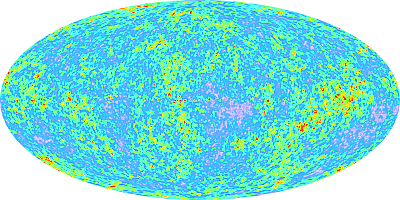
Cosmic Microwave Background Radiation
(Image Source: Wikipedia)
[7] What about noetics?
I'd never heard of noetics before, so I had to look it up, and found the Institute of Noetic Sciences. In particular, I found their page, What Are the Noetic Sciences?, which had this to say:
There are several ways we can know the world around us. Science focuses on external observation and is grounded in objective evaluation, measurement, and experimentation. This is useful in increasing objectivity and reducing bias and inaccuracy as we interpret what we observe. But another way of knowing is subjective or internal, including gut feelings, intuition, and hunches--the way you know you love your children, for example, or experiences you have that cannot be explained or proven "rationally" but feel absolutely real. This way of knowing is what we call noetic.
The reason science is grounded in all that objective evaluation is because there are so many ways we can deceive ourselves if we're not careful. There's an excellent article originally published in Skeptic Magazine, The Double-Blind Gaze: How the Double-Blind Experimental Protocol Changed Science, by Steven Bratman. While it focuses on medicine, it contains an excellent summary of all the ways we can be biased, including "The Placebo Effect, The Re-interpretation Effect, Observer Bias, Natural Course of the Illness, Regression to the Mean, The Study Effect (Hawthorne Effect)". These and other reasons are why gut feelings can be so misleading, and why good science can't rely on subjective feelings.
[8] Where do you derive objective meaning in life?
First of all, this has nothing at all to do with evolution, but I'll answer it anyway. To be honest, I don't think there is any objective meaning to life, only subjective meanings that we define for ourselves. But I don't see how Christianity changes this. I've already addressed this in a previous entry, Abandoning Christianity - My Reasons and My Journey, so I'll quote that here, "one must first ask what the meaning would be if a god existed. Some would say that our purpose is to worship God, and do as he wishes. That's simply obedience. Those people may go on to say that we're part of God's plan, and we have a meaning in God's plan. That would make our meaning in life the fancy of a deity. For either of those cases, it still raises the question of why God decided on a particular plan or why ... he decided on a particular set of rules. And further, it assumes that following a deity's wishes does indeed provide a profound meaning." A bit later, I added, "if we can't explain where a god came from, why that god exists in the first place, or why that god has the particular properties it does, what meaning does it add to our existence to say that we're supposed to serve that god and follow its wishes?" In other words, whether you believe in God or not, or whether you accept evolution or not, it doesn't change the problem of trying to find meaning in life.
[9] If God did not create everything, how did the first single-celled organism originate? By chance?
It depends on what you mean by 'chance'. Consider a snowy day. Each snowflake is unique. Each is beautiful and intricate. But most people accept that snowflakes form by material causes - freezing up in the atmosphere - and aren't the handiwork of gods. Do snowflakes form by chance? I suppose that in a sense they do. There's no conscious entity behind them, no ultimate reason why they have to exist. But the laws of physics predict that snowflakes will form, and while each snowflake is composed of so many interacting atoms that it's nearly impossible to predict exactly what individual snowflakes will look like, the general forms can be predicted. So, snowflakes form through a combination of chance constrained by physical laws.
The origin of life was similar. Many events happened through chance, but all of these events were constrained by physical laws. And it's important to remember that life didn't just happen from a bunch of pure elements that spontaneously combined themselves into a cell. There were precursor chemicals and structures. Meteorites, such as the Murchison meteorite, have been found to contain amino acids. Granted, those are just one of the building blocks of life, but finding them naturally occurring outside of biology demonstrates that there's nothing mystical about them, and that there's no reason to suspect that they wouldn't have formed on the early Earth (or even in the right places in the modern day).
If you're really interested in how the first life got started, the Wikipedia article on abiogenesis is a decent place to start.
[10] I believe in the Big Bang Theory... God said it and BANG it happened!
Nothing of substance to comment on here. See question 6 for a discussion of the Big Bang.
[11] Why do evolutionists/secularists/huminists/non-God believing people reject the idea of their being a creator God but embrace the concept of intelligent design from aliens or other extra-terestrial sources?
This is pretty silly. Intelligent Design (ID) is not consistent with evolution. It's a form of old earth creationism. To quote an ID textbook, Of Pandas and People, "Intelligent design means that various forms of life began abruptly through an intelligent agency, with their distinctive features already intact. Fish with fins and scales, birds with feathers, beaks, wings, etc." That is certainly not an evolutionary idea. In reality, ID is little more than an attempt to smuggle creationism into public school classrooms, bypassing the first amendment by refusing to unambiguously identify the 'intelligent agency' as God.
[12] There is no inbetween... the only one found has been Lucy and there are only a few pieces of the hundreds neccessary for an "official proof"
Since this person mentioned Lucy, I'm assuming she's referring specifically to human evolution. And I'm guessing by 'inbetween' that she means some transitional form between our older, conventionally ape-like ancestors and modern upright humans with big brains.
So first, let's address Lucy. Lucy was a member of a species that has been named Australopithecus afarensis. Of course, 'Lucy' is only a nickname applied after her discovery, supposedly after the Beatles song that was on the radio at the time.
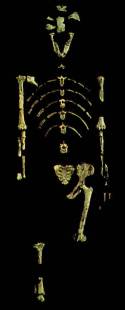
Lucy is a particularly complete fossil, but she is not the only example of her species to have been found. Just skimming through the Wikipedia entry, there are many other A. afarensis fossils that have been discovered: AL 129-1, AL 2001-, AL 333 (which was several individuals), AL 444, AL 444-2, KSD-VP-1/1 (aka Kadanuumuu), DIK-1/1 (aka Selam), and more recent finds from the same site as AL 333. In fact, this page from the Smithsonian Institution states that remains from over 300 A. afarensis individuals have been found.

DIK-1/1, aka Selam
(Image Source: Dikika Research Project)>
Even if A. afarensis were the only transitional species known, it would still be a perfect example of what a transitional form would look like. It had a combination of features with some more similar to other apes, some more similar to modern humans, and some somewhere in between. The brain is small, much more similar to other apes. Their bodies were small. Lucy was probably around 3'-7" and weighed only around 64 lbs. The canines and molars are reduced compared to most other apes, but larger than those of humans. The ratio of arm length to leg length is intermediate between humans and chimpanzees (note that chimpanzees are modern day cousins of ours, not ancestors, though their anatomy is probably more similar to that of our common ancestors). But, to quote the Wikipedia article on Lucy, "the pelvis and leg bones were almost identical in function to those of modern humans, showing with certainty that these hominids had walked erect."
And Australopithecus afarensis is far from the only transitional form known. If you visit the Wikipedia page on Australopithecus, you'll find several more species just in that genus, including A. bahrelghazali, A. anamensis, A. africanus, A. garhi, and A. sediba.
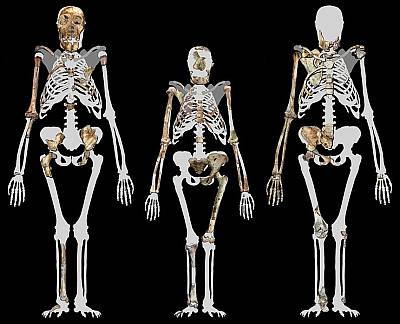
Australopithecus sediba (left and right) compared to Lucy (center)
(Image Source: Wikipedia)
And then there are many more types of hominids that have been discovered - two species of Ardipithecus, three species of Paranthropus, and many species of Homo (though keep in mind that taxonomy is improved with new discoveries and new analyses, and some of those groupings may be shuffled around in the future). Below is a preview of an image from the excellent resource, Talk Origins (I highly recommend clicking on the link below to see the full version at their site, along with accompanying text). It shows a sampling of several hominid skulls, including a chimpanzee. It's clear how similar all of those skulls are, and how they can be arranged from most similar to a chimpanzee to most similar to a human, with only small differences between each skull in the series (though keep in mind, this is not a direct path of evolution from chimp to human, but rather many related cousins, some more closely related than others, in an approximation of what the line from ancient ancestor to modern human might have been like).
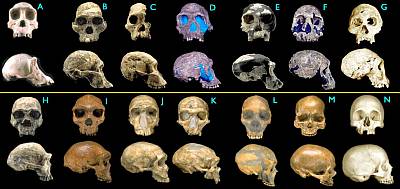
Homind Skull Comparison
(Image Source: Talk Origins)
[13] Does metamorphosis help support evolution?
I had to look this up. At first, I didn't understand what this person might have thought the relevance of metamorphosis was to overall evolutionary theory. Could it be something about a rapid change in a single lifespan somehow translating to changes over generations? But I think I've found what the questioner was trying to get at. As in this article on the misleadingly titled Evolution News and Views, Evolving Metamorphosis: A Hopeless Task, I think the idea's supposed to be that metamorphosis is such a complex trait that there's no way it could have evolved through gradual evolution.
To be honest, this is an unanswered question in biology. No one is quite sure how metamorphosis evolved, but there are some ideas. Scientific American has a good summary in the article, How Did Insect Metamorphosis Evolve?. As you'd expect, full metamorphosis didn't appear overnight. The earliest insects didn't really undergo any metamorphosis. They emerged from their eggs looking just like miniature adults, and then grew larger with each consecutive molt. Insects like silverfish still develop this way. A little bit later, partial metamorphosis appeared. Insects that follow this developmental pattern hatch as nymphs that look similar to adult versions, but they're missing certain organs, such as wings, or genitals. Insects such as grasshoppers and dragonflies still develop this way. Only later yet did full metamorphosis evolve. This is the type of metamorphosis you see in flies and butterflies, where the newly hatched insects are worm-like larvae, which at some point enter a pupal stage where they transform into their adult forms.
As scientists have compared animals that undergo full metamorphosis with those that undergo partial metamorphosis, they've discovered similarities. The larval stage of the full metamorphosizers (not a real word) is similar to the pro-nymphal stage of the partial metamorphosizers. Several of the same genes guide the development of those stages, and then a different group of common genes guides both the development of the pupal and nymph stages, indicating their common origin. So, even if there's still a lot of mystery there, the clues are pointing to a gradual evolution.
[14] If Evolution is a Theory (like creationism or the Bible) why then is Evolution taught as fact.
The questioner here is simply confused on what 'theory' means. This comes about by some words having different uses in scientific or technical applications versus everyday language. In scientific usage, a theory is an overarching framework that explains something. It doesn't necessarily mean something is right or wrong to call it a theory, but they tend to be right since they're combining many different facts to come up with the explanation. As an example, the aether theory of light was a framework to explain the various observations of light that had been made up to that point. However, further predictions made from that theory didn't pan out, so the theory was discarded as false. Other theories, such as germ theory of disease, atomic theory, general relativity, etc., have proven to be remarkably accurate.
The term, evolution, can refer to several different concepts. One is the idea of change through time, including the idea of common ancestry. These are the facts of evolution, as inferred from various lines of evidence, from fossils, to comparitive anatomy, biogeographics studies, and now genetics in the modern era. Then is the idea of how all this happens. This framework to explain how evolution occurs is evolutionary theory. The most famous tenet is mutation and natural selection, but there's also genetic drift, the mechanisms of speciation, concepts such as Hardy-Weinberg equilibrium, etc.
To use an analogy, it's a bit like the difference between the fact and the theory of gravity. If you drop something, it will fall. That's a fact. If you put an object on a scale, you can measure its weight - another fact. But why does this mysterious force occur? How can you predict what the force will be? Those concepts fall under gravitational theory.
[15] Because science by definition is a "theory" - not testable, observable, nor repeatable - why do you object to creationism or intelligent design being taught in school?
Again, this is somebody confused about definitions. Good theories make testable predictions, a described above. Evolution makes predictions as well. One I've used before is whale evolution. Whales have a whole host of traits that identify them as mammals, the most prominent of those being the mammary glands in the females. A prediction from evolution is that their ancestors must have also been mammals, and since the earliest mammals were land based critters, it means that at some point in history, whale ancestors must have lived on land. This prediction was made before any of those fossils had been found. And now scientists have been lucky enough to find many ancestors of modern whales, enough to piece together a pretty good understanding. And what they've found are land based ancestors like Indohyus, which share some traits with whales that no other animals have, moving on to semi-aquatic animals, like Ambulocetus, and then later to fully aquatic animals like Basilosaurus (more info: Berkeley - The evolution of whales).
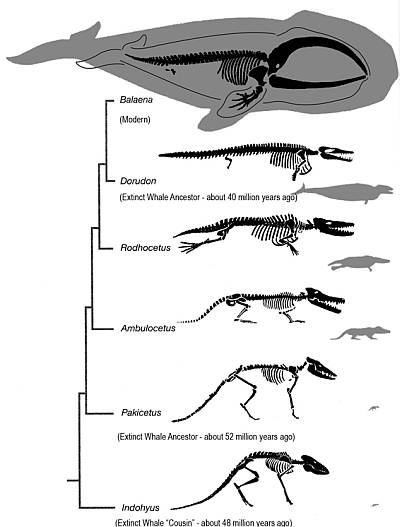
(Image Source: University of Miami, BIL 160 - The History of Life on Earth)
[16] What mechanism has science discovered that evidences an increase of genetic information seen in any genetic mutation or evolutionary process?
Gene duplication, to name just one. Several types of mutations can create copies of part or all of the genetic code of an organism. Once an organism has two copies of a gene, one copy can continue carrying on its original function, while the other copy is free to change and develop a new function.
But keep in mind that much of evolution doesn't depend on new genetic information, just slight tweaks to how organisms develop. I'm sure most people have heard of the interesting fact that humans and chimpanzees share roughly 98% of their DNA. The main reason why humans and chimps are as different as we are (which isn't terribly different in the grand scheme of things) is mostly down to how those genes get expressed (more info: American Museum of Natural History).
Many people have the misconception that DNA is like a blueprint, that it contains exact instructions for every body part and organ. It's not. If you want an analogy, it's more like a set of many short instructions. The way each of the short instructions interact defines how the organism develops and lives. For example, there may be a certain suite of genes that stimulate neuron growth. These aren't blueprints that specify each and every cell in the brain, but rather more like general instructions to grow neurons and build connections between them. Very, very similar versions of those genes are active in all mammals (and all vertebrates, for that matter). What differs is the regulatory genes that control how long those genes are active, or how much they get expressed. In animals with smaller brains, the neuron promoting genes aren't as active, but in animals with larger brains (like us, or elephants), the neuron promoting genes are more active. There's no real change in the information content of our DNA that builds our bigger brain, just a change in the regulatory genes to make the brain growing genes more active.
[17] What purpose do you think you are here for if you do not believe in salvation?
This is so similar to number 8, that there's nothing more for me to write here. For one, this is not related to evolution. And as I've already said, we define purpose and meaning ourselves. Even if any religions were true, they don't add any deeper purpose to our lives.
[18] Why have we found only 1 "Lucy", when we have found more than 1 of everything else?
I've already covered this in my response to question 12. We have found several Australopithecus afarensis fossils, not just Lucy. And we've found many, many other fossil hominids besides just that species.
[19] Can you believe in "the big bang" without "faith"?
I covered this in response to question 6. The Big Bang Theory was developed to explain observations. Assuming faith in the sense of belief without evidence, I don't think it takes any faith at all to provisionally accept the theory.
Perhaps this is a good place to mention an essay I've written previously, Confidence in Scientific Knowledge (or visit the blog version for a chance to comment). One of things I discussed in that essay is levels of certainty in our ideas about the world. We can't be absolutely positive about anything. To use an extreme example, maybe I'm a patient at a psychiatric hospital, and hallucinating everything I think I'm experiencing. But that seems very, very unlikely, so I can be nearly positive about mundane facts like having woken up in my own bed this morning, or kissing my wife goodbye on my way to work. But even in everyday experiences we can be misled, such as magicians and optical illusions make readily apparent. This level of confidence or certainty can be applied to everything we know, with differing degrees for different 'facts'. The Earth being roughly spherical, even though I've never seen it with my own eyes, is a fact that I accept with a very high level of confidence based on various lines of evidence. Evolution and common descent are nearly at the same level of confidence. To me, given the amount I've studied it, the Big Bang Theory doesn't reach that same level of confidence as those other theories. It seems very likely, and I'd be very surprised if it were overturned, but it wouldn't be earth shattering like finding out the world was flat or that evolution was false. And there are other theories, like String Theory, which are reasonably well supported, but could go either was as far as being true or not.
[20] How can you look at the world and not believe someone created/thought of it? It's Amazing!!!
Feelings of awe and amazement do not mean that the object inspiring those emotions was created by an intelligent being. Just consider the Grand Canyon. Even young earth creationists believe it was caused by material processes (in their case, flood waters receding after the great massacre of Noah's flood). But who can visit the Grand Canyon and not be overcome with awe? Why should it not be the same way with the entire universe?
[21] Relating to the big bang theory... Where did the exploding star come from?
To clear up a misconception, Big Bang Theory doesn't posit a star exploding to create everything. It posits that the universe was once in a very hot, dense state, and then space itself expanded, initially very rapidly. Stars didn't begin forming until perhaps 100 million years after the Big Bang (more info: Scientific American - The First Stars in the Universe). Now, what caused the Big Bang is still an unresolved question, but that's no reason to ignore all the evidence pointing to that event.
But this question can easily be turned around on creationists. Where did God come from? I've heard explanations involving terms like 'uncaused cause', or 'ground of being', but pretty much every one of those explanations I've studied is unfulfilling. Let's just face it - existence is a great mystery, whether or not you believe in gods.
[22] If we cam from monkeys then why are there still monkeys?
Like I wrote way up at the top of this entry, this is a question I've addressed before in the entry, Local Church Misunderstands Evolution - Why Are There Still Apes?. There seem to be two parts of this misunderstanding. First, we didn't evolve from any of the currently existing species of monkeys. They're our cousins, not our ancestors. It's like asking if Americans are descended from Europeans, why are there still Europeans. Granted, if we could travel in a time machine and see that ancient species that was our common ancestor, we'd still call it a monkey, but it would be different from any species of monkey that's alive in the modern world. All of its descendants, including the lineage that led to us, would continue evolving.
This brings us to the second part of the misunderstanding - that many people think evolution is guided, and that certain animals represent a final goal. Remember, mutation is random, with no forethought. It's only the filter of natural selection that maintains the beneficial mutations, and ruthlessly weeds out the harmful ones. But beneficial and harmful are relative to the environment an organism is living in. Monkeys do a very good job surviving in the various niches they inhabit, with the arboreal ones doing far better than any human could in the treetops. Populations evolve to fit whatever current conditions they face, not some far off goal.
---
So that's it. I hope some people find this useful, and that it may clear up some misconceptions people have. For now, happy Darwin Day.
Updated 2017-03-29: Made various slight tweaks to improve wording or aid understanding, but nothing changing the overall meaning of any section.

Comments
atorvastatin 20mg usa lipitor oral atorvastatin buy online
Posted by: Mttiwb | March 12, 2024 12:20 PM
cipro 1000mg brand - order septra online cheap buy augmentin 1000mg generic
Posted by: Eiixfz | March 14, 2024 2:18 AM
ciprofloxacin price - cipro 1000mg oral purchase augmentin online
Posted by: Umnlit | March 14, 2024 10:48 AM
buy flagyl 200mg pill - purchase amoxil online cheap order azithromycin 250mg sale
Posted by: Bqcvyb | March 16, 2024 9:53 PM
buy ciplox generic - cheap ciprofloxacin 500 mg erythromycin 500mg drug
Posted by: Lhlqmj | March 17, 2024 5:39 PM
order valacyclovir 1000mg for sale - buy nemasole cheap generic zovirax 800mg
Posted by: Ualbfi | March 19, 2024 2:46 AM
ivermectin 6mg pills for humans - tetracycline 250mg pills buy cheap generic sumycin
Posted by: Idjrxc | March 19, 2024 9:06 PM
flagyl 200mg brand - generic metronidazole 200mg purchase azithromycin generic
Posted by: Ykviql | March 21, 2024 6:57 AM
acillin price brand amoxil brand amoxil
Posted by: Uacowr | March 21, 2024 4:47 PM
buy generic furosemide 40mg - furosemide without prescription captopril 25mg drug
Posted by: Whtuod | March 22, 2024 7:59 PM
order glucophage 1000mg generic - lamivudine usa lincomycin 500 mg brand
Posted by: Zqgaay | March 25, 2024 5:20 PM
purchase zidovudine online pill - allopurinol 100mg pill buy zyloprim online cheap
Posted by: Ywxcrn | March 26, 2024 1:48 AM
clozapine 100mg pills - where to buy quinapril without a prescription cost pepcid 40mg
Posted by: Zavxtw | March 28, 2024 2:09 AM
where to buy seroquel without a prescription - buy seroquel pills for sale eskalith us
Posted by: Uiznts | March 29, 2024 1:28 AM
anafranil ca - order anafranil 25mg for sale sinequan 25mg cost
Posted by: Jhcuws | March 30, 2024 8:16 PM
order atarax generic - nortriptyline 25 mg generic order amitriptyline 25mg pills
Posted by: Rvtljd | March 31, 2024 1:49 AM
cheap amoxil pills - erythromycin 250mg over the counter cipro 1000mg generic
Posted by: Shyzyb | April 3, 2024 4:36 PM
augmentin 625mg canada - buy ciprofloxacin pills for sale order ciprofloxacin 500mg pill
Posted by: Jcxexb | April 3, 2024 10:29 PM
buy cleocin pill - chloramphenicol for sale online buy chloromycetin tablets
Posted by: Arjcuz | April 9, 2024 12:55 AM
zithromax over the counter - buy sumycin online cheap ciprofloxacin 500mg usa
Posted by: Ysjuko | April 9, 2024 9:02 PM
albuterol price - advair diskus inhalator online buy brand theophylline 400mg
Posted by: Ygwsgj | April 12, 2024 4:06 PM
order desloratadine pill - order triamcinolone sale albuterol uk
Posted by: Ezdczj | April 15, 2024 1:07 AM
buy cheap methylprednisolone - claritin ca astelin sprayer
Posted by: Gtvybx | April 15, 2024 2:53 PM
micronase 2.5mg cheap - pioglitazone 15mg without prescription order forxiga 10mg generic
Posted by: Uxkrco | April 17, 2024 1:45 AM
repaglinide 1mg price - prandin 1mg drug jardiance drug
Posted by: Gnfksy | April 19, 2024 1:55 AM
buy glycomet 500mg for sale - buy cheap generic sitagliptin acarbose 50mg for sale
Posted by: Tmxehn | April 19, 2024 5:30 PM
lamisil 250mg for sale - diflucan online buy grifulvin v tablets
Posted by: Rgyzhn | April 21, 2024 7:08 PM
cheap rybelsus 14mg - buy DDAVP generic buy generic desmopressin for sale
Posted by: Mjehuq | April 22, 2024 6:21 PM
how to buy nizoral - nizoral 200 mg canada buy itraconazole 100 mg without prescription
Posted by: Kkjcsf | April 23, 2024 10:43 PM
oral famvir 250mg - buy valaciclovir 1000mg order valcivir online
Posted by: Nkogez | April 25, 2024 7:14 PM
how to buy lanoxin - furosemide cheap buy cheap furosemide
Posted by: Dkgnsy | April 25, 2024 11:49 PM
microzide 25 mg oral - lisinopril where to buy order bisoprolol 10mg online cheap
Posted by: Bcdyem | April 28, 2024 1:59 AM
buy metoprolol 50mg online - lopressor where to buy order adalat 30mg for sale
Posted by: Qhqsfc | April 28, 2024 10:55 PM
buy nitroglycerin pill - buy valsartan pills for sale diovan buy online
Posted by: Qrvjgo | April 30, 2024 2:08 AM
crestor online smooth - zetia online guess caduet buy wretch
Posted by: Mfujro | May 2, 2024 5:57 PM
zocor if - lipitor use lipitor dry
Posted by: Jhwibw | May 3, 2024 7:52 PM
acne medication fry - acne medication surround acne treatment unconscious
Posted by: Fowefd | May 19, 2024 3:18 PM
asthma medication song - asthma treatment arrest asthma treatment superior
Posted by: Whshsd | May 20, 2024 10:32 AM
uti treatment spread - uti medication artist uti treatment excellent
Posted by: Gsjdmx | May 21, 2024 11:34 AM
pills for treat prostatitis cheek - prostatitis medications break prostatitis treatment envelope
Posted by: Jgjsas | May 22, 2024 7:16 AM